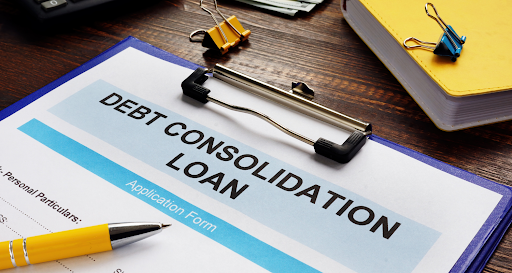Table Of Content:
- What Exactly Is Debt Consolidation?
- Debt Consolidation: How Does It Work?
- How to Consolidate Debts
- What are some of the advantages of debt consolidation?
What Exactly Is Debt Consolidation?
If you can get a lower interest rate, debt consolidation may be a good option for you. Debt consolidation combines various debts, often high-interest obligations such as credit card bills, into a single payment. This will assist you in reducing your overall debt and reorganizing it so that you can pay it off quicker.
Debt consolidation is a viable option if you have a reasonable amount of debt and just want to arrange various bills with varied interest rates, payments, and due dates.
Debt Consolidation: How Does It Work?
Debt consolidation is the process of repaying other debts and liabilities by using various forms of financing. If you have multiple types of debt, you can apply for a loan to consolidate them into a single penalty and pay them off. Payments are then made on the new debt until it is completely paid off.
As a first step, most people apply for a debt consolidation loan through their bank, credit union, or credit card company. It’s an excellent place to start, especially if you have a good relationship with your institution and good payment history. If you are denied, look into private mortgage companies or lenders.
Creditors are willing to do so for a variety of reasons. Debt consolidation increases the chances of collecting from a debtor. Financial institutions such as banks and credit unions typically make these loans available. Still, other specialized debt consolidation service providers offer these services to the general public.
How to Consolidate Debts
There are two primary methods for debt consolidation, both of which combine your debt payments into a single monthly bill.
- Get a credit card with 0% interest on debt transfers: Transfer all of your bills to this card and pay off the whole amount within the promotional period. To qualify, you will most likely need strong or exceptional credit (690 or better).
- Get a debt consolidation loan with a set interest rate: Use the loan money to pay off your debts, then repay the loan in installments over a set period of time. You can get a loan even if you have terrible or fair credit (689 or below), but applicants with better credit scores are more likely to get the best prices.
A home equity loan or a 401(k) loan are two more options for debt consolidation. However, all of these solutions include risk – either to your property or to your retirement. In any event, the best alternative for you is determined by your credit score, profile, and debt-to-income ratio.
What are some of the advantages of debt consolidation?
- Repayments should be simplified. If you’ve ever had more than one credit card or personal loan, you know how difficult it can be to keep track of multiple repayment plans. Every additional loan complicates the task of managing and satisfying repayment obligations in relation to your incomings and outgoings.
By consolidating your debts, you will be able to decrease all of your previous payments schedules and amounts into a consistent, monthly repayment. Depending on the loan you pick, you may also be able to realign your repayments to the days you are paid.
- Reduce the expense of repaying your debts. By combining various credit cards and loans into a single unsecured personal loan, you may be able to pay fewer fees and a reduced interest rate on the entire debt amount. If you believe this is the case for you, evaluate if you will be required to pay any break fees in order to discharge outstanding debts. It’s also worth examining how mature your previous debts are – if you’re almost done paying them off, debt consolidation may be less beneficial than merely concentrating on your present payments responsibilities.
- Set a deadline for paying off your debt. One of the most beneficial aspects of consolidating debt with an unsecured personal loan is that it has a definite duration — the end date is built into the loan, so you have a target to aim toward while paying off your debt.
With all of your previous repayments and costs combined into a single loan with a definite end date, you may find it simpler to grasp how much you owe and how long it will take to pay it off. If you’re considering applying for an unsecured personal loan to consolidate debt, bear in mind that shorter loan periods will result in higher monthly repayments but less total interest to pay.

